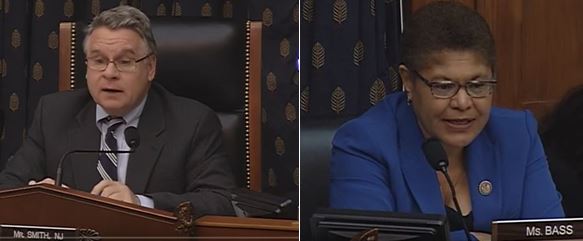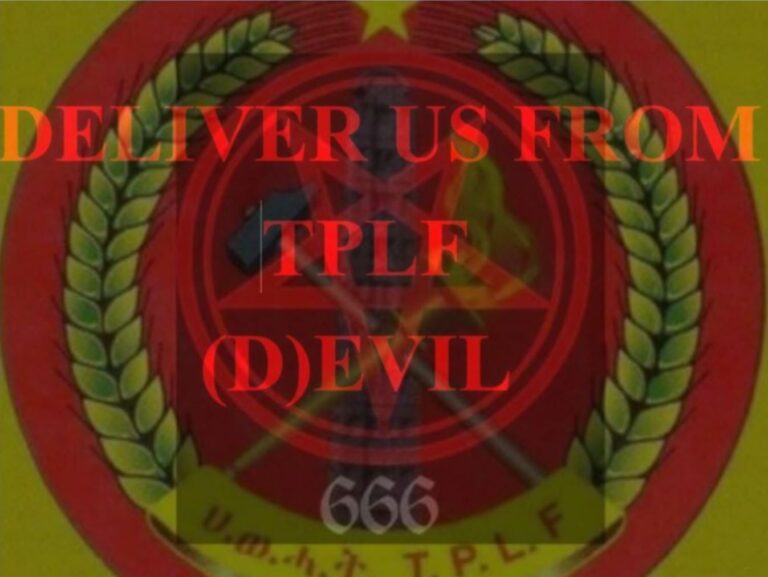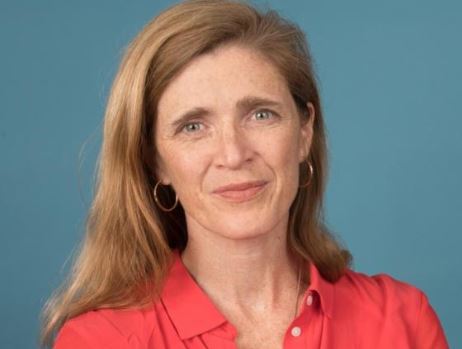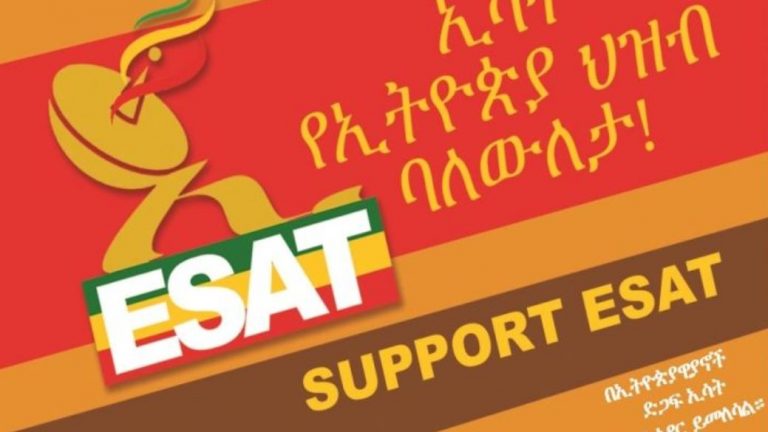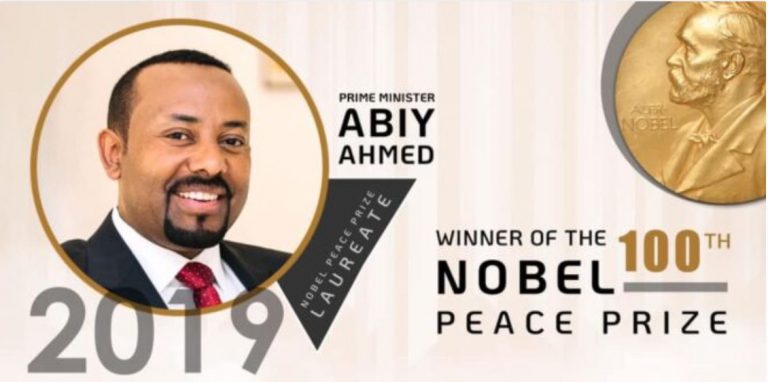Hearing Ethiopia on The Hill
“Having been on this Committee now 36 of my 37 years, I have to tell you that I remember when Nicolae Ceaușescu of Romania, one of the most brutal dictatorships, with the Securitate, the KGB equivalent, every year his lobby form would come around with bullet points. They made them look like they were Mother Theresa. It’s just incredible.
“We’ve got a very sophisticated report from the Embassy [of Ethiopia] which I suspect is prepared in whole or in part by their lobby organization which was set up and funded January 1st SGR LLC; and if the filings we’ve seen are correct, we’re talking about a $1.8 million per year cost for the lobby. We all need to look at that submission [by SGR LLC] carefully, but the lobby firms are very adroit at putting together that obscure, very often, the heinous human rights abuses we are trying to highlight.”
Chairman Chris Smith, comparing the nearly $2 million lobby efforts of the T-TPLF regime to that of Nicolae Ceaușescu’s Cold War communist regime of Romania at the “Democracy Under Threat in Ethiopia” Hearing (3/9/2017).
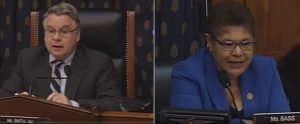
Author’s Note: On March 9, 2017, the Africa, Global Health, Global Human Rights, and International Organizations Subcommittee of the U.S. House of Representatives held a “legislative” hearing on “Democracy Under Threat in Ethiopia”. The hearing was conducted partly in preparation for further legislative action on the pending H.R 128 (“Supporting respect for human rights and encouraging inclusive governance in Ethiopia.”) introduced on February 15, 2017.
Committees of Congress rely on hearings to gather, analyze and synthesize information, facts and opinion in the course of the legislative drafting process. Often, government officials, special interest groups, academics and ordinary citizens likely to be impacted by proposed legislation are invited to testify before a hearing.
There are different types of hearings: oversight (focusing on performance or federal programs and officials); investigative (focusing on possible official wrongdoing); confirmation (solely in the Senate on presidential nominations) and field (held outside of Washington, D.C.)
Congressional hearings are useful not only in drafting effective legislation but also serve to inform and educate the public on the work of their elected representatives, provide transparency and accountability in the legislative process and encourage civic action and engagement, among other things.
Those who regularly follow Congressional hearings on C-SPAN, Youtube and other media are likely to learn more about government and feel empowered to act.
Below are “snippets” taken from statements made by Subcommittee members and witnesses who testified at the “Democracy Under Threat in Ethiopia” hearing. Snippets will not tell the full story and all are encouraged to watch the video or read the statement of witnesses. The snippets have been edited for syntax.
The full hearing is available on Youtube HERE.
The written statements of witnesses are available HERE.
Go tell it on Capitol Hill and “hew out of the mountain of despair a stone of hope” for Ethiopia
Subcommittee Chair Christopher Smith:
We have no opposition parties appearing today [given] the tendency of the “Ethiopian] government and its supporters to see anyone, anyone who disagrees with them and their actions as supporting terrorists seeking to overthrow the government; presumably this Subcommittee falls in that realm as well.
There are at least 10,000 more people held in jail who are considered political prisoners and the government continued to arrest and detain critics of its actions.
In January, journalists from the faith-based Radio Bilal, Khaled Mohammad and Garsema Sori were sentenced to 5 and 4 years for reporting on government interference in religious affairs.
Referring to the 2016 U.S. Human Rights Report: The “government” of Ethiopia “has killed hundreds of people in 2016” and “tens of thousands have been detained without due process of law.”
Menashe Levy [an Israeli businessman] has been in prison for a year and half on allegedly financial crimes charges. The government officials charged with levy have been released from jail but Levy’s trial continues to be delayed. Levy has been beaten in jail and denied proper medical care.
The government has denied United Nations Commissioner for Human Rights access to Oromiya and Amhara regions.
We have introduced H.R. 128 to provide a “true picture, as true as can be painted as to what’s going on in Ethiopia today.”
We’ve got a very sophisticated report from the Embassy [of Ethiopia] which I suspect is prepared in whole or in part by their lobby organization which was set up and funded January 1st SGR LLC and if the filings we’ve seen are correct, we’re talking about a $1.8 million per year cost for the lobby. We all need to look at that submission carefully, but the lobby firms are very adroit at putting together [materials] to obscure, very often, the heinous human rights abuses we are trying to highlight.
It is my belief that until the government of Ethiopia can squarely face the consequences of its actions, there will not be the genuine reform it has supported. For example, government officials say, ‘We have mistakenly said the ruling coalition holds 100 percent of the legislative seats whether in the name of the coalition itself or as an affiliate parties. The government cannot be honest with us or itself in such an obvious manner, it is unlikely the conditions for reform can exist. The government seems to realize it is in a precarious position.
Karen Bass, Ranking Member:
There is a huge number of people outside [the hearing room] that are not able to come in; hopefully we can find room for them [to come in] over time [by rotating people in the gallery].
The Ethiopian American community has bee has been one of the most successful African Diaspora communities in the U.S.
The Ethiopian Diaspora has never turned its back on its country and has contributed millions of dollars in remittances to the country’s economy.
There are numerous reports of the government committing arbitrary and unlawful killings using excessive force against protesters. The protesters were mainly in Oromiya and Amhara regions. At year’s end, more than 10 thousand people are believed to have been detained.
The suspension of civil liberties [under the state of emergency] affects every facet of life. The people cannot travel around to visit friends or relatives or carry on business.
Terrence Lyons, Associate Professor, School for Conflict Analysis and Resolution, George Mason University:
Predictions that the ruling Ethiopian People’s Revolutionary Democratic Front (EPRDF) was heading toward a crisis have been common over the years [but the regime] has demonstrated greater resilience than many analysts – this author included – understood.
It is important to recognize that the ruling party retains considerable strength. It has successfully expanded and institutionalized its system of authoritarian control, virtually eliminating independent space for opposition political parties, civil society organizations, and non-state media. The party has approximately 8 million members and controls mass organizations for women and youth, humanitarian and development organizations, and large economic enterprises.
In 2016 an unprecedented wave of protests erupted in Oromia and later in the Amhara National Regional State. The Ethiopian regime has followed a pattern in responding to protests. The regime typically refuses to consult or open dialogue with protesters but rather launches mass arrests, particularly of young men. Allegations of torture of those arrested are widespread and credible. On some occasions, live fire has been used to disperse crowds, resulting in the deaths of demonstrators.
Ethiopia appears to be at an important crossroads. The protests and State of Emergency suggest that the political dispensation put in place by the EPRDF in 1991 is unlikely to remain the basis for a stable political order. The [regime must take specific] steps: End the state of emergency and reduce the role of the Ethiopian Defense Force in domestic political affairs. Release political prisoners, notably Bekele Gerba and Merera Gudina as well as journalists and other prominent activists, and initiate an all-inclusive political dialogue with all political parties. Scrap the civil society proclamation and replace it with regulations to encourage non-governmental organizations to engage in advocacy, rights based development, and monitoring on human rights and democracy. Recognize and protect the space for legally registered alternative political parties to articulate their policy positions and critique of the incumbent regime. Engage in dialogue with all stakeholders on revising the electoral law, reforming the National Election Board, allowing domestic election observation, and allocating state-owned media time to all political parties.
Felix Horne, Senior Researcher at Human Rights Watch (Ethiopia and Eritrea)
Many Ethiopians live in fear. The current government – the only one since 1991 – runs the country with an almost complete grip on power, controlling almost all aspects of political, public, and even much private life. Pervasive telephone and online surveillance and an intricate network of informants allow the government to quickly curb any threats to its control; it silences critical voices through the use of arbitrary arrests and politically motivated prosecutions. Ethiopia remains among Africa’s leading jailors of journalists.
Independent civil society groups face overwhelming obstructions. The 2009 Charities and Societies Proclamation has made obtaining foreign funding nearly impossible for groups working on human rights, good governance, and advocacy and leading members of the human rights movement have been forced to flee abroad and many organizations have stopped working on human rights and good governance to avoid problems.
The state systematically ensures that many of the country’s 100 million citizens are dependent on the government for their livelihoods, food security and economic future. It controls the benefits of development including access to seeds, fertilizers, jobs, health care, and humanitarian assistance, even when funded by the US or other donors. [U.S. Aid] adds to the repressive capacity of the government by bolstering Ethiopians’ reliance on the government for their livelihoods and ultimately for their survival.
Since imposing the state of emergency, the Ethiopian government has repeatedly committed publicly to undertake “deep reform” and engage in dialogue with opposition parties but the only changes the government has made so far are largely cosmetic and fall dramatically short of the protesters’ calls for the protection of basic human rights.
Despite abundant evidence of serious and growing repression by the Ethiopian government, particularly since the 2005 election, the US government has been a muted critic. Quiet diplomacy proven ineffectual and has coincided with the dramatic downward spiral in human rights and a serious constriction of political space that has led to the crisis Ethiopia is in today. It is time for a new US approach to Ethiopia in which Congress can play a leadership role in seeking a more balanced policy and requiring more deliberate oversight as it has done in other countries in crisis, including the Democratic Republic of Congo and Egypt.
Ms. Seenaa Jimjimo, President, Coalition of Oromo Advocates for Human Rights and Democracy
In a single year from Nov 2015-2016, over 1000 Oromos were killed. Using the emergency law, the regime forces citizens to feed armies patrolling the street, literally paying to keep its killers alive. Even though it seems like lots has happened to the world, for us, Oromos abuse by the state has always been part of our upbringing, the fiber that made who we are. What made 2016 special to us is not the amount of lives lost rather the fact the world has finally come to know and see the true color of this government, and the suffering of the Oromo people.
As early as January 2016 the Ethiopian government admitted to use of excessive force, no single individual has as of yet been brought to justice. Six month after its admission, in June HRW release a 61 page document detailing interviews with hundreds of people who survived gruesome and inhuman acts by the security forces. As protests continued the government continued giving lip services to the western government by admitting that there were indeed serious issues of lack of good governance and that they will open talks with opposition parties. However, now two years later nothing has changed except the implementation of a brutal system of killing and silencing innocent people under the cover of martial law.
Among the most horrific acts of crime by this government, the October 2 Irreacha massacre stands as the darkest day in modern history for the Oromo where hundreds were killed though the government puts the causality at 53.
We know in no democratic country, let alone in Ethiopia, can a ruling party win an election by 100%. The “victory” of Ethiopian’s 2015 election, is achieved by using the AntiTerrorism Proclamation to lock up opposition leaders as terrorists, intimidate their supporters, and rig the election when all else fails. Sadly, the US government, my government, is looking the other way.
For now, under the draconian state of Emergency, Ethiopia may seem calm and the government may say they have brought back law and order but that should not fool us because we know the truth. Ethiopia is a country of 100 million people inhabited by 82 different ethnic groups. Such a diverse state could not survive under a fake federalism.
Tewodrose Tirfe, Co-Founder Amhara Association of America
TPLF purports to represent the Tigray ethnic group which makes up 6% of the population. In essence, the result of the TPLF’s rule is a minority party controlling the majority of the population in Ethiopia. Since coming to power, the TPLF ruling party has been persecuting Amharas to achieve their mission as stated in their Manifesto.
The TPLF led government has forcefully annexed historical Amhara lands of Wolkite, Tegede, Humera, Tselemete and Raya-Azebo to Tigray. The TPLF transferred thousands of Tigray settlers to the annexed Amhara land in an attempt to change the demographic make-up of the region. The land mass of the Tigray Region has grown by a 3rd since annexation of historical Amhara lands including lands annexed from the Afar Region. This forced annexation has had a devastating effect on the Amhara people in the Wolkite Region. The Amhara people in Wolkite [have] their native tongue Amharic suppressed. Widespread discrimination, killing, arrest, torture, and confiscation of land have led to many of the ethnic Amhara people in this region escaping to Gonder City, other regions of Ethiopia, and foreign countries for survival.
As stated in the 2007 Ethiopian Census that was released in 2010, the Amhara population was short by 2.5 million. A debate was not even allowed in parliament when this fact was presented. Some estimates have the number now closer to 5 million. We believe there has been a systematic effort by the government to depopulate the Amhara population. Thus, the recent protests by Amharas was not about democracy or economics, but was simply about their identity, their land, and the need to survive as a people.
The Amharas of course are not the only victims of this brutal regime; we have witnessed the atrocious violence committed against Oromos where thousands have been killed while peacefully protesting, the Konso people, Anuaks, Afars, Somalis, and I can go on and on. It is very disturbing to see a government forcefully remove millions of people from the land they have farmed and cared for for thousands of years only to be sold to foreign investors and the beneficiaries being TPLF bureaucrats.
As an Ethiopian-American based organization, Amhara Association of America would like to make the following recommendations to our elected officials: All Foreign Aid to be tied directly to measurable improvement towards democracy and improvements in human rights. Release of all journalists, political opposition leaders and members, human rights activists, and protesters who were arbitrarily detained during and after the protests. Allow opposition political parties, independent media, independent civil institutions to operate without persecution. Open up radio, television, and Internet to private and independent Ethiopian companies. All these entities are now under the control of the Ethiopian government. Repeal the Anti-Terrorism Proclamation (ATP) which has been used to jail journalists, human rights activists, and opposition politicians and the 2009 Charities and Societies Proclamation (CSO) which has shuttered many nongovernmental organizations. Stop the persecution of Amharas and other ethnic groups and return and integrate Wolkite and Raya-Azebo Region to the Amhara State. Allow for international, independent, and transparent investigation to the cause of 2.5-5 million missing Amharas [and victims] of [killings] by Ethiopian security forces. [Impose] immediate and targeted sanctions including travel visa bans to individuals and entities that have committed internationally recognized human rights atrocities.
Guya Abaguya Deki, Representative, Torture Abolition and Survivors Support Coalition
Ethiopia is a one-party ethnic dictatorship ruled by cadres from the Tigray ethnic group, which makes up only six percent of Ethiopia’s population; Ethiopia’s largest ethnic groups are the Oromo and the Amhara. The EPRDF has held power since 1991 and wants control over the entire civilian population [including] women’s associations, youth associations and all the associations representing people with disabilities. They will not allow any independent organization in the country. Because I was the leader of a disability rights organization, the government tried to force me to join the ruling party. They wanted me tell the media and my community what a great job the ruling party was doing for disabled people. But none of this was true. The government punished me by detaining me nine times, torturing me and forcing me to flee Ethiopia in 2013.
I was continually harassed and intimidated by the government because I refused to participate in activities to promote the ruling party. The security forces kept warning me: “You are defaming the ruling party. You are agitating people with disabilities against the government.” In 2007, security forces abducted me in a van and took me to a forest called Ashewa meda, in the Burayu area, about 25 kilometers from Addis Ababa. They threw me and my wheelchair out of the van, breaking one of my fingers and badly bruising my shoulders. They thought I would be killed and eaten by hyenas, the area where they threw me was known as a forest with lots of hyenas. Local families from the Oromo ethnic group found and rescued me.
I hope that House Resolution 128 passes Congress which calls on the Secretary of State and the Administrator of USAID to improve oversight and accountability of United States assistance to Ethiopia. This aid is essential to people like me. But the government diverts far too much of this aid for political purposes, to promote the ruling party and pay off government supporters. There needs to be a stronger monitoring mechanism to ensure American funds are used wisely, and not to strengthen Ethiopia’s one-party ethnic dictatorship.
Yoseph Tafari, Co-Founder, Ethiopian Drought Relief Aid of Colorado
From the early days of its foundation, TPLF goals has been well documented. It is to breakup over the Ethiopian population by ethnic identity while simultaneously controlling all the nation’s resource for the benefit of a single ethic minority group. All actions in every layer of civic duties, legislation, public policy, economic planning as well as national security is shaped by this singular mission. Today Ethiopia is strained to a breaking point due to excessive marginalization of the majority ethnic Ethiopians in the last 25 years. Desperate for their lives, hundreds of thousands of Ethiopians are fleeing the country making it one of the world’s top refugee producing nation.
The TPLF is a silent killer utilizing covert methods including assassins, sniper sharp shooters, poisoning, and numerous inhuman methods against its own people. The Emergency decree is an added blanket tool in its lethal arsenal to efficiently execute its barbaric measures against humanity.
Much ink has been spelled in documenting the crimes of the TPLF regime against the Ethiopian people. In short Ethiopia is a country with no opposition, judicial system, civil society, independent media or political space. Instead the country has turned into closed killing chambers and the prisons and detention centers are packed with thousands of political prisoners while the world is looking the other way.
Ethiopia has been gripped by Apartheid like system of governess affecting 100 million of its citizens. The regime has repeatedly showed the world that it operates much as an underground criminal enterprise than ruling body with mandate to govern an ancient country like Ethiopia. All its activity and sheer existence is for monetary gain from the nation which has made few individuals of the inner circle fabulously wealthy. To these individuals Ethiopia is for sale and the asset of the nation is to be monetized in every turn. By providing material assistance it receives under the pretext of “ally against terror’ the regime should never be given the license to terrorize its own people.
Where do we go from here?
Is H.R 128 likely to pass? What’s in H.R. 128?
H.R. 128 is hortatory. It exhorts and encourages the “government of Ethiopia” to take and refrain from taking certain actions to improve its human rights record and set a course for inclusive good governance. It does not contain specific measures aimed at securing compliance with set requirements.
H.R. 128 could be seen as a shot across the bow, a warning shot before Congress takes more drastic and forceful action in the nature of H.R 2003 (Ethiopia Democracy and Accountability Act of 2007).
H.R. 128 “condemns” specific actions of the regime in Ethiopia and “calls” on the regime, the State Department and USAID to take remedial actions.
H.R. 128 “condemns” the regime’s arbitrary killings, arrests and detentions of journalists and political leaders who exercise their constitutional rights and the politically abusive application of the “Anti-Terrorism Proclamation” to stifle dissent.
H.R. 128 “calls” on the “Government of Ethiopia to lift the state of emergency; end the use of excessive force by security forces; conduct a full, credible, and transparent investigation into the killings in the Oromia and Amhara regions; release imprisoned dissidents, activists, and journalists; respect constitutional rights and allow a rapporteur appointed by the United Nations to conduct an independent examination of the state of human rights in Ethiopia.”
H.R. 128 calls on the Secretary of State to conduct a review of security assistance to Ethiopia in light of recent developments and the Administrator of the USAID to immediately lead efforts to develop a comprehensive strategy to support improved democracy and governance; to improve oversight and accountability of United States assistance to Ethiopia, take appropriate sanctions on foreign persons or entities responsible for extrajudicial killings, torture, or other gross violations of human rights.
The fact of the matter is that the T-TPLF does not give a hill of beans about H.R. 128 or whatever the Africa Subcommittee will do. The T-TPLF is confident that its multi-million dollar lobbyists and Senator James Inhofe will stop any legislation with teeth dead in its tracks. They have a track record of doing that.
For now, the T-TPLF is laughing at the Africa Subcommittee and all of the Ethiopian Americans working to improve human rights in Ethiopia.
I take a rather philosophical view of the T-TPLF laughing at us all. In the words of Victor Hugo, “Never laugh at those who suffer; suffer sometimes those who laugh.”
And so I shall!!!

